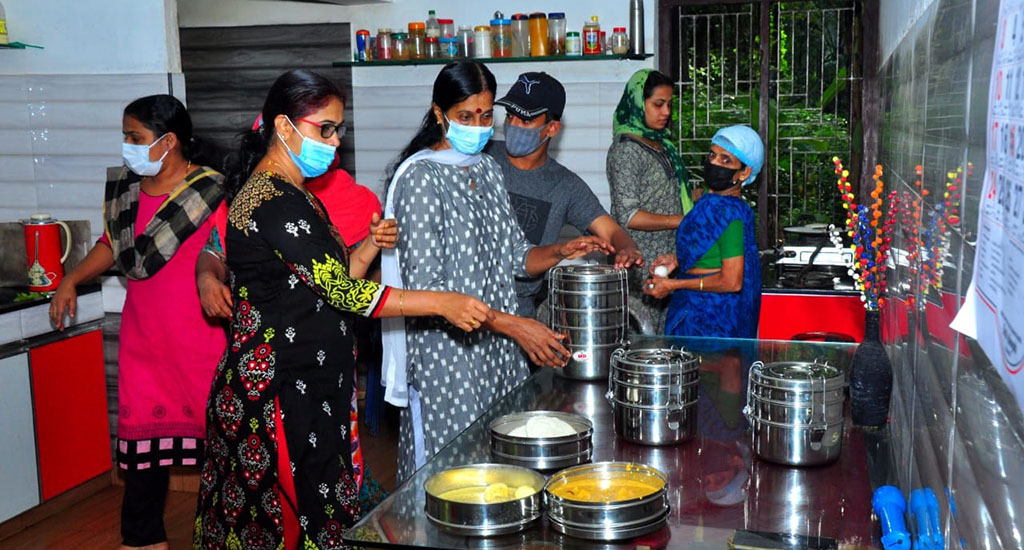
Common kitchens – what’s cooking in Kerala?
Work and other commitments vying for time, one cannot spare time to cook. What started out of necessity for two couples is making "common kitchens' spring up across Kerala.

Work and other commitments vying for time, one cannot spare time to cook. What started out of necessity for two couples is making "common kitchens' spring up across Kerala.
Common kitchens?
“Think of it as a kitchen where you’re cooking for a big family,” said Sundaran, the cook in Kerala’s first common kitchen.
The ‘family’ here is generally a group of families in a neighbourhood.
“This is not like your regular catering service, because that’s a commercial business,” Sundaran added.
Home-grown cooks like Sundaran prepare food in their own kitchen for a lot of people who are pressed for time to cook.
‘Adukkala ozhivakku, adukkala thozhilakku,’ quit the kitchen and make cooking a paid job, is a win-win for those running the common kitchens as well as the families receiving the food. And it is a growing trend across Kerala.
Out of necessity Ramesan, a bank employee in Ponnani in the Malappuram district, wanted to outsource his meals.
His friends, advocate couple Kaleemudheen and Majida, also wanted someone to cook for them.
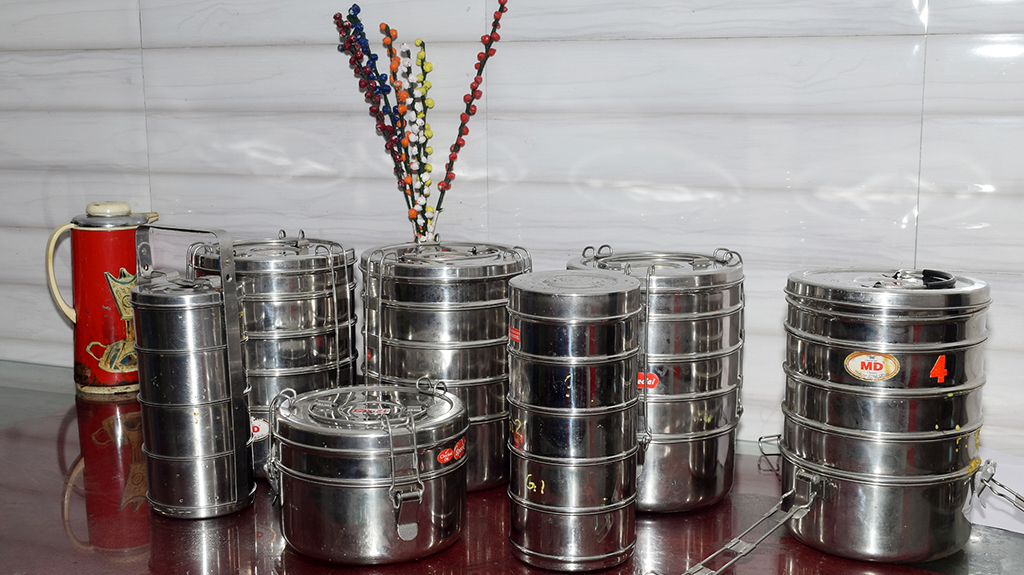
“Working on case files, chores, taking care of the kid, cooking – all takes time,” said Majida. “It was a daily tug-of-war between me and the clock.”
Their search ended when Sundaran agreed to cook for them.
Ramesan and Kaleemudheen wanted to outsource their meals for many reasons.
For one, it is not easy to get a person to come home and cook. It is also expensive.
Even if a person was willing, he or she will need to come very early. Because breakfast and lunch will have to be prepared before everyone left for work or school.
“My wife used to wake up at 3:30 in the morning to complete all the cooking and washing of vessels before rushing to her workplace which is 40km away,” said Sivadasan K, a treasury officer. “I couldn’t help because of health issues.”
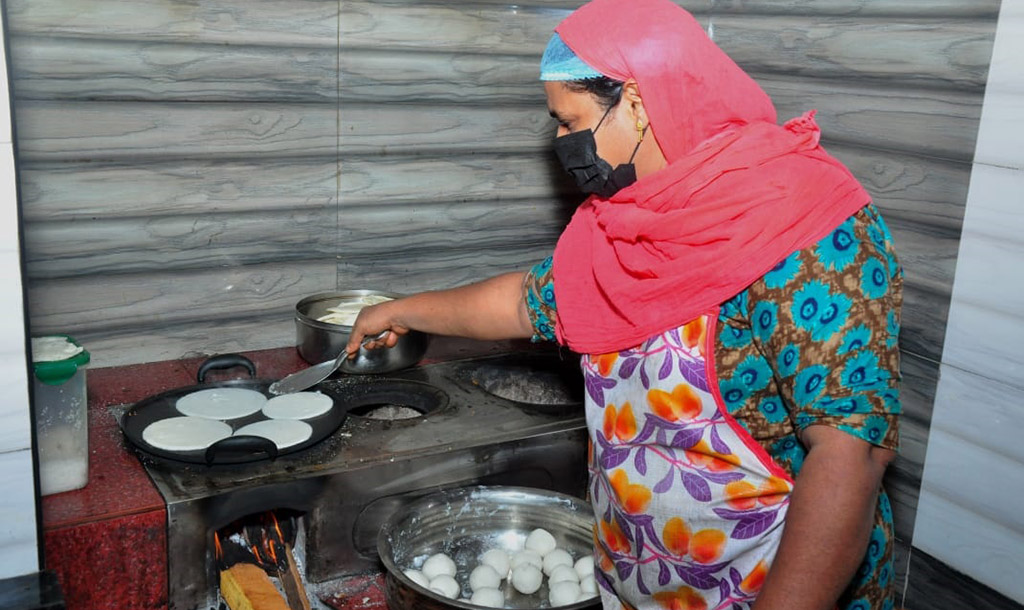
Getting a home cook would mean waking up early to let them in. Never mind finding househelp to also clean the pots and pans can also be a struggle.
Hiring someone to bring fully cooked meals was more convenient for everyone.
When Sundaran started cooking meals for Ramesan and Kaleemudheen in 2020, his kitchen became popular.
There were many people in similar situations who worked and lacked time. There were also elderly and unwell people who could not cook.
The common kitchen model was so convenient that many people showed interest.

Soon Sundaran was cooking for 34 families. There were so many enquiries that the group was split and another kitchen was started.
Whenever the demand increases, a new common kitchen is started so that the quality and taste is not compromised.
Unlike simply ordering food from restaurants, the common kitchens are not only about the value for money but the cooks place a lot of importance on hygiene, nutrition and taste.
For instance, all the cooks use only home-made masala.
“I prepare it here and never use packaged masala. My family also eats the same food,” Aysa, a common kitchen cook in the village of Baluserry, told Village Square. “Even the coconut oil is prepared in an oil mill here.”
The cooks use many nutritious vegetables found in backyard gardens too.
“When I cooked I never made yam, drumstick leaves and banana flowers since they take so much time and effort to prepare,” said Majida. “Now we enjoy such delicious and nutritious dishes because there’s someone else to cook for us with care.”
The dishes can also remind people of the delicate flavours of the past.
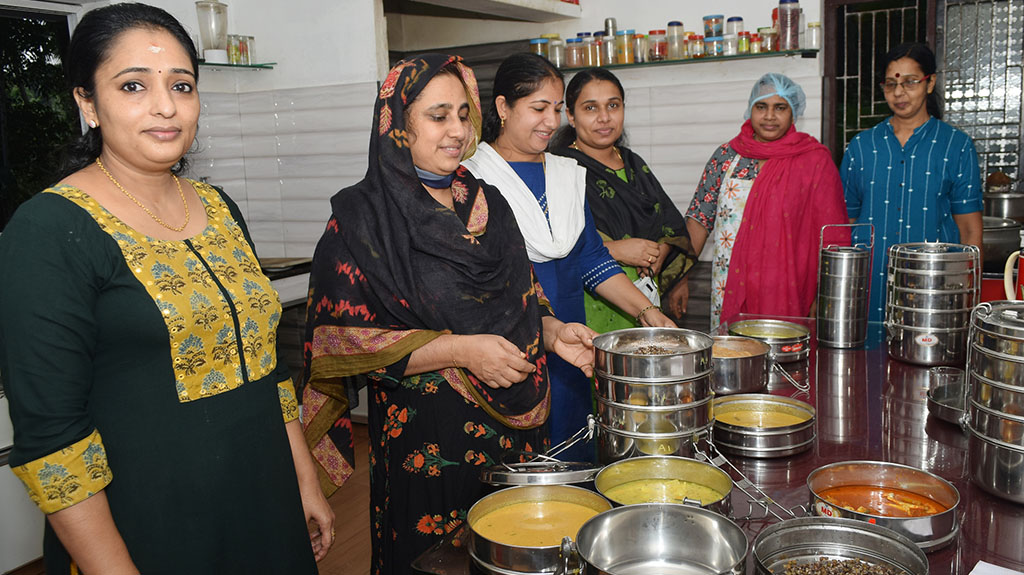
“Aysa’s desi dishes bring back childhood memories of my mom’s cooking,” said Sivadasan.
It’s not just the cooking time that is outsourced, the common kitchens also save on time people spend planning menus and buying food.
In a monthly meeting, member families decide each day’s menu.
“We meet one day and fix the menu for the entire month,” said Aysa. “Meeting up is not difficult since my kitchen’s members are my neighbours.”
Purchasing groceries in bulk also helps cut the food costs.
Often families contribute coconut and seasonal veggies grown in their own gardens free of cost, which also helps save money.
“Often I skipped breakfast since I didn’t have time after cooking, packing lunch for my family and then cleaning,” said Lousi, a medical records librarian in a taluk hospital. “After work I had to cook dinner. I felt like a machine.”
With breakfast and dishes for lunch delivered at home now, Lousi only makes afternoon tea and dinner.
“Now I have time for breakfast. And more time for my kids,” she said. “I never dreamt I could practice dance every day. But I do.”
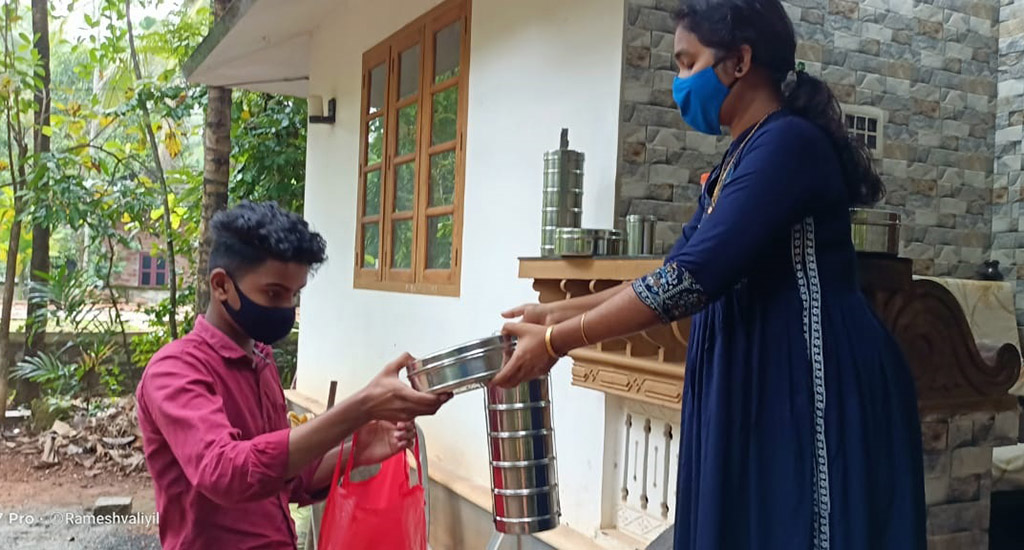
Women like Shalu, a homemaker, now only use their kitchens to make special dishes for the family.
Shalu finds time for gardening and working out with her husband at the gym.
While the members of a kitchen save time and money, it is remunerative for those in charge of the kitchen.
In addition to a per-plate tariff, the members fix a remuneration for the cooks.
For Sundaran, the common kitchen proved to be a boon, since he was in desperate need for work. More and more are finding the work fruitful.
“I enjoy cooking. It’s like I prepare food for a big family,” said Padmini, who assists Aysa. “And I earn a decent salary too.”
Some working women who longed for some free time, did have a similar idea years ago.
“Though we’d planned a common kitchen long ago, it materialised only now,” Girija Parvathi, a teacher – now retired – and founder member of Balussery common kitchen told us. “I’m happy to see my young friends manage their time well now.”
Now there are a number of common kitchens in Ponnani, besides in Kozhikode, Malappuram, Kannur, Thrissur districts.
“Though some people laugh at us for outsourcing our meals, most people accept it happily,” said Girija Parvathi. “Don’t dismiss it as a working women’s fancy or middleclass trend. It’s spreading because it benefits everyone.”
The increasing number of common kitchens springing up in rural areas now prove her right.
Former state finance minister and social development expert Thomas Isac foresees common kitchens bringing women’s empowerment and social development.
Obviously the local administration thinks so too. In the recently released budget, the Kozhikode corporation plans to pilot 10 common kitchens that would be executed through local self-help groups.
Chithra Ajith is a journalist based in Kozhikode, Kerala.